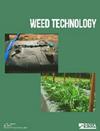马铃薯生产系统中减少常见小羔羊(Chenopodium album)种子产量的作物打顶策略评价
IF 1.7
3区 农林科学
Q3 AGRONOMY
引用次数: 0
摘要
加拿大大西洋爱德华王子岛省(PE)和新不伦瑞克省(NB)的马铃薯生产商依靠抑制光系统II(PSII)的除草剂来控制一季的杂草。尽管如此,该地区仍有很大一部分普通产羔者被确定对这类除草剂具有耐药性。作物打顶是一种晚季杂草管理方法,利用杂草和发育中的作物冠层之间的高度差。2020年和2021年,在宾夕法尼亚州哈灵顿进行了两项田间试验,分别评估了不同的作物打顶策略,即在两个马铃薯酚学阶段,在冠层上方割草或灯芯施用草甘膦,对普通产羔者的活种子产量和马铃薯产量和质量的影响。开花后割草的普通产羔者在2020年降低了活种子产量(72%-91%),但在2021年增加了种子产量(78%-278%)。在这两年里,割草对不同品种的马铃薯市场产量影响最小。相比之下,用灯芯施用的草甘膦处理普通产羔者对2020年的种子产量产生了不同的影响,但在2021年,当在开花前进行处理时,种子产量大幅下降(高达95%)。草甘膦对马铃薯块茎的损害不受时间的影响,由于黑斑和腐烂,导致被扑杀的块茎增加了14%-15%。我们的研究结果强调了在选择作物打顶策略时,马铃薯和普通产羔者酚学的重要性,并证明了在马铃薯生产系统中,遮荫上割草和灯芯施用草甘膦可用于抗除草剂普通产羔器的种子库管理。本文章由计算机程序翻译,如有差异,请以英文原文为准。
Evaluation of crop-topping strategies to reduce common lambsquarters (Chenopodium album) seed production in potato production systems
Potato producers in Canada’s Atlantic provinces of Prince Edward Island (PE) and New Brunswick (NB) rely on photosystem II (PSII)-inhibiting herbicides to provide season-long weed control. Despite this fact, a high proportion of common lambsquarters populations in the region have been identified as resistant to this class of herbicides. Crop-topping is a late-season weed management practice that exploits the height differential between weeds and a developing crop canopy. Two field experiments were conducted in Harrington, PE, in 2020 and 2021 one each to evaluate the efficacy of a different crop-topping strategy, above-canopy mowing or wick-applied glyphosate, at two potato phenological stages, on common lambsquarters viable seed production and potato yield and quality. Mowing common lambsquarters post-flowering decreased viable seed production (72%-91%) in 2020 but increased seed production (78%-278%) in 2021. Mowing had minimal impact on potato marketable yield across cultivars in both years. In contrast, treating common lambsquarters with wick-applied glyphosate had variable impacts on seed output in 2020 but dramatically reduced seed production (up to 95%) in 2021 when treatments were applied pre-flowering. Glyphosate damage to potato tubers was not influenced by timing and resulted in a 14%-15% increase in culled tubers due to black spotting and rot. Our results highlight the importance of potato and common lambsquarters phenology when selecting a crop-topping strategy and demonstrate that above-canopy mowing and wick-applied glyphosate can be utilized for seedbank management of herbicide resistant common lambsquarters in potato production systems.
求助全文
通过发布文献求助,成功后即可免费获取论文全文。
去求助
来源期刊

Weed Technology
农林科学-农艺学
CiteScore
2.90
自引率
21.40%
发文量
89
审稿时长
12-24 weeks
期刊介绍:
Weed Technology publishes original research and scholarship in the form of peer-reviewed articles focused on understanding how weeds are managed.
The journal focuses on:
- Applied aspects concerning the management of weeds in agricultural systems
- Herbicides used to manage undesired vegetation, weed biology and control
- Weed/crop management systems
- Reports of new weed problems
-New technologies for weed management and special articles emphasizing technology transfer to improve weed control
-Articles dealing with plant growth regulators and management of undesired plant growth may also be accepted, provided there is clear relevance to weed science technology, e.g., turfgrass or woody plant management along rights-of-way, vegetation management in forest, aquatic, or other non-crop situations.
-Surveys, education, and extension topics related to weeds will also be considered
 求助内容:
求助内容: 应助结果提醒方式:
应助结果提醒方式:


